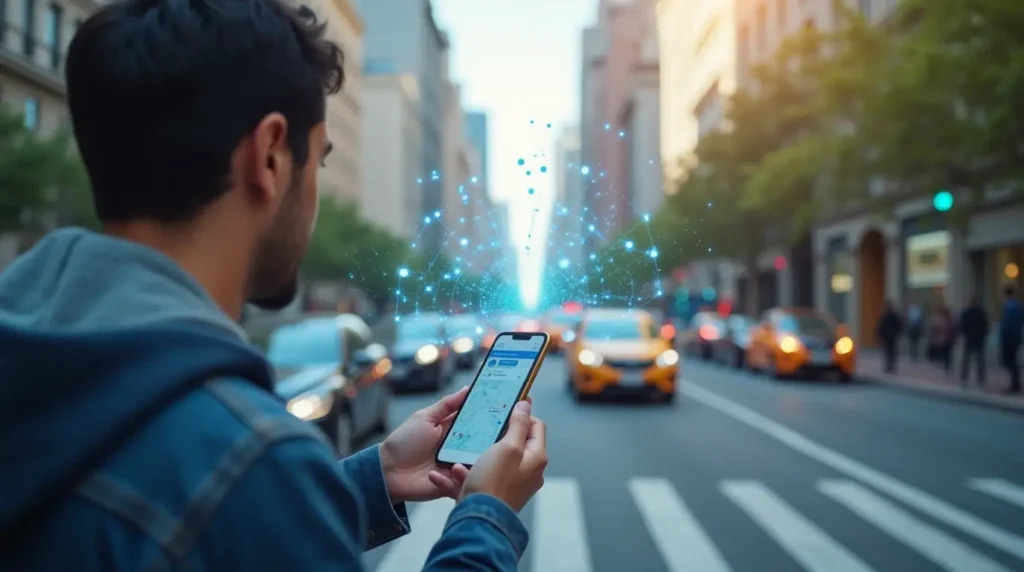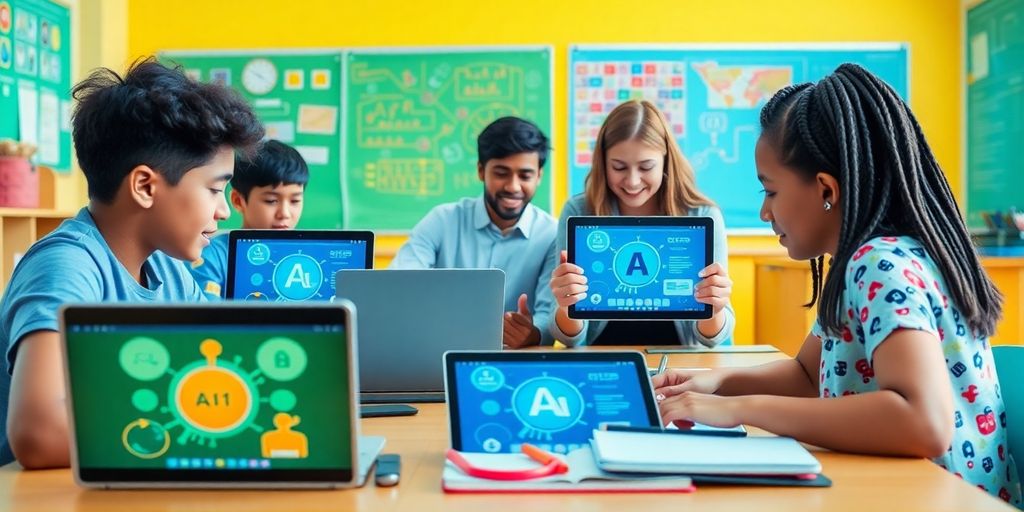Artificial Intelligence (AI) has become a significant part of our daily lives, influencing how we interact with technology and the world around us. From smartphones to smart homes, AI is everywhere, making tasks easier and more efficient. This article explores the AI Basics and how AI works in everyday life, clearly understanding its role in modern society.
Table of Contents
Key Takeaways
- AI is a technology that helps machines think and learn like humans.
- It has evolved significantly, becoming more advanced and useful over time.
- AI is found in personal devices like smartphones and virtual assistants, making them smarter.
- In homes, AI helps with automation, energy saving, and security systems.
- AI is changing transportation with self-driving cars and better traffic management.
Understanding AI Basics in Modern Life

Defining Artificial Intelligence
Artificial Intelligence, or AI, refers to the ability of machines to perform tasks that typically require human intelligence. AI can learn, reason, and solve problems, making it a powerful tool in our daily lives. Here are some key points about AI:
- AI can recognize speech and images.
- It can make decisions based on data.
- AI systems can improve over time through learning.
The Evolution of AI Technology
AI has come a long way since its inception. It started with simple algorithms and has evolved into complex systems that can analyze vast amounts of data. The timeline of AI development includes:
- Early AI (1950s-1970s): Basic problem-solving.
- Machine Learning (1980s-2000s): Systems that learn from data.
- Deep Learning (2010s-present): Advanced neural networks that mimic human brain functions.
AI in the Digital Age
In today’s digital world, AI is everywhere. From social media to online shopping, AI helps improve our experiences. This page provides a simple guide on how to use AI in daily life. It emphasizes practical applications of artificial intelligence tools to enhance everyday activities, making technology accessible to everyone. Here are some areas where AI plays a crucial role:
- Personalized recommendations on streaming services.
- Smart assistants that help manage tasks.
- AI-driven analytics for businesses to understand customer behaviour.
AI is not just a futuristic concept; it is a part of our everyday lives, making tasks easier and more efficient.
AI in Personal Devices
Smartphones and Virtual Assistants
AI has transformed our smartphones into smart companions. These devices learn from our usage patterns with features like voice recognition and predictive text. For example, virtual assistants like Siri and Google Assistant can help us manage our schedules, send messages, and even control smart home devices. They adapt to our preferences, making our interactions more personal and efficient.
AI-Powered Applications
Many apps now use AI to enhance user experience. Here are some ways AI is integrated into applications:
- Personalization: Apps learn what you like and suggest content based on your interests.
- Automation: Tasks like scheduling and reminders are automated, saving you time.
- Data Analysis: AI analyzes your data to provide insights, helping you make better decisions.
Enhancing User Experience with AI
AI is all about making technology work better for us. Here are some key benefits:
- Improved Efficiency: AI helps apps run smoother and faster.
- Better Recommendations: Whether music, movies, or shopping, AI suggests options you might love.
- Seamless Integration: AI connects different devices, allowing them to work together effortlessly.
AI is not just a tool; it’s a part of our daily lives, making everything from communication to entertainment more enjoyable.
In summary, AI in personal devices is about creating a more tailored experience. As technology evolves, we can expect even more innovative features to enhance our daily routines.
AI in Home Automation

Smart Home Devices
AI is changing how we live at home. Smart home devices can learn from our habits and make our lives easier. These devices include:
- Smart speakers that respond to voice commands.
- Smart lights that can be controlled remotely.
- Thermostats that adjust temperatures based on your preferences.
AI for Energy Efficiency
Using AI in our homes can help save energy. Here are some ways it does this:
- Smart thermostats learn when to heat or cool your home.
- AI can turn off lights when no one is in the room.
- It can suggest energy-saving tips based on your usage.
Security Systems and AI
AI also plays a big role in keeping our homes safe. Some features include:
- Cameras that can recognize faces.
- Alarm systems that alert you of unusual activity.
- Smart locks that can be controlled from your phone.
AI-based smart homes can have intelligent automations, virtual assistants, and machine learning algorithms that grow with homeowner habits.
In summary, AI in home automation is about making our lives easier, safer, and more efficient. With smart devices, we can enjoy a more comfortable living environment while also saving energy and enhancing security.
AI in Transportation

Autonomous Vehicles
Autonomous vehicles, or self-driving cars, are one of the most exciting developments in transportation. These vehicles use AI to navigate and make decisions on the road. They rely on sensors, cameras, and advanced algorithms to understand their surroundings. This technology aims to reduce accidents and improve traffic flow.
AI in Traffic Management
AI is also transforming how we manage traffic. By analyzing data from various sources, such as traffic cameras and GPS, AI can help optimize traffic signals and reduce congestion. Here are some benefits of AI in traffic management:
- Improved traffic flow
- Reduced travel time
- Lower emissions
Public Transportation Innovations
Public transportation is becoming smarter with AI. Many cities are using AI to enhance their public transport systems. For example, AI can predict bus arrival times and adjust schedules based on real-time demand. This leads to a better experience for commuters.
AI is changing the way we think about transportation, making it safer and more efficient for everyone.
| Feature | Traditional System | AI-Enhanced System |
|---|---|---|
| Traffic Signal Control | Fixed Timings | Adaptive Timing |
| Bus Scheduling | Static Timetable | Dynamic Adjustments |
| Accident Response | Manual Reporting | Automated Alerts |
AI in Healthcare

AI in Medical Diagnostics
AI is changing how doctors find and treat illnesses. With AI, doctors can analyze medical images faster and more accurately. For example, AI can help spot tumours in X-rays or MRIs that a human might miss. This technology is making it easier to catch diseases early, which can save lives.
Personalized Medicine with AI
AI is also helping to create personalized treatment plans for patients. AI can suggest the best medications and therapies by looking at a person’s health data. Here are some ways AI is used in personalized medicine:
- Analyzing genetic information to find the right drugs.
- Monitoring how patients respond to treatments.
- Adjusting plans based on real-time health data.
AI in Health Monitoring
AI tools can keep track of a person’s health over time. For instance, wearable devices can collect data about heart rate, sleep patterns, and activity levels. These devices can send alerts if something seems wrong. This helps people stay healthy and catch problems before they become serious.
AI is not just a tool; it’s a partner in healthcare, helping both patients and doctors make better decisions.
| AI Application | Benefits |
|---|---|
| Medical Imaging | Faster and more accurate results |
| Personalized Treatment | Tailored health plans |
| Health Monitoring | Continuous tracking and alerts |
AI in Education

AI-Driven Learning Platforms
AI is changing how students learn. AI-driven platforms can adapt to each student’s needs, making learning more personal. These platforms can track progress and suggest resources that fit individual learning styles. Some popular examples include:
- Khan Academy: Offers personalized learning experiences.
- Duolingo: Adapts language lessons based on user performance.
- Coursera: Provides tailored course recommendations.
Personalized Education Experiences
With AI, education can be more tailored. Personalized education means that lessons can be adjusted to fit each student’s pace and style. This can help students understand better and stay engaged. Here are some benefits of personalized education:
- Students learn at their speed.
- Lessons can focus on areas where students struggle.
- Increased motivation and interest in learning.
AI for Administrative Efficiency
AI also helps schools run better. It can automate tasks like grading, scheduling, and report generation, significantly reducing the workload on educators. Tools like Gradescope provide consistent and objective grading, allowing teachers to focus more on teaching. Here’s how AI improves administrative tasks:
- Saves time for teachers.
- Reduces human error in grading.
- Helps in managing student data efficiently.
AI basics are transforming education, making it more effective and accessible for everyone.
In summary, AI is making a big impact in education by personalizing learning, improving administrative tasks, and creating better learning platforms. This technology is helping students and teachers alike, making education more engaging and efficient.
AI in Entertainment
AI in Streaming Services
AI has changed how we watch shows and movies. Streaming platforms use AI to suggest what you might like based on your watch. This makes it easier to find new content that fits your taste. For example, Netflix and Hulu analyze your viewing habits to recommend similar shows.
Video Game Development with AI
In video games, AI helps create smarter and more realistic characters. Game developers use AI to design opponents that can learn from your actions, making the game more challenging and fun. AI can also help create vast game worlds that feel alive and responsive.
AI for Content Recommendations
AI plays a big role in discovering new music, movies, and shows. By analyzing your preferences, AI can suggest content that you might enjoy. This personalization helps keep you engaged and entertained. Here are some ways AI enhances content recommendations:
- Analyzing user behaviour to understand preferences.
- Creating personalized playlists based on listening habits.
- Suggesting new releases that match your interests.
AI in media and entertainment enhances production quality and personalizes user experiences, transforming how audiences engage with media.
AI is making entertainment more enjoyable and tailored to each person’s likes. It’s exciting to see how technology continues to shape our experiences in this field! Explore how AI has impacted your life at “Applied Digital Skills with Google“.
Conclusion
AI is a big part of our daily lives, even if we don’t always notice it. From the apps we use on our phones to the smart devices in our homes, AI helps make things easier and more efficient. Seeing how this technology changes how we live, work, and play is amazing. By understanding how AI works, we can better appreciate its role in our everyday activities and look forward to even more exciting developments in the future.
Frequently Asked Questions
What is artificial intelligence?
Artificial intelligence, or AI, is when machines are made to think and act like humans. This can include learning, solving problems, and making decisions.
How has AI changed over the years?
AI has improved a lot since it was first created. It started with simple tasks; now, it can do very complex things, like understanding speech and recognizing images.
Where do we see AI in our daily lives?
AI is everywhere! You can find it in your phone, smart home devices, and even how websites recommend movies or products.
What are smart home devices?
Smart home devices are gadgets that use AI to help make your home more comfortable and efficient. Examples include smart speakers, thermostats, and security cameras.
Can AI help with health care?
Yes! AI can help doctors find diseases faster and create personalized patient treatment plans, making health care better for everyone.
How does AI improve education?
AI can create learning programs that adapt to each student’s needs, helping them learn at their own pace and making school more enjoyable.
